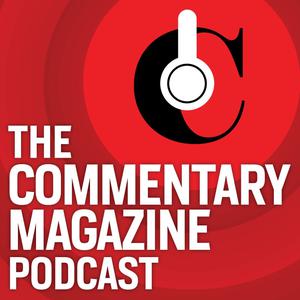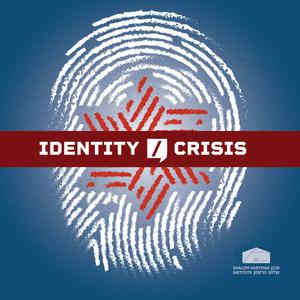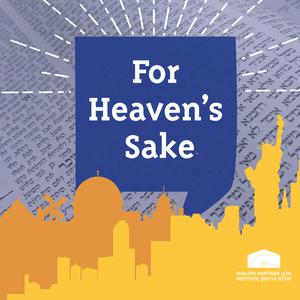
The Tikvah Podcast
The Tikvah Fund
- 51 minutes 39 secondsRuth Wisse on the Explosion of Anti-Israel Protests on Campus
Anti-Israel campus activism has never been more popular or unpleasant than it is right now. In years past, much of this activism was mixed up with nods to the desire for peace and a two-state solution that would allow for Palestinians to enjoy their own sovereignty alongside a secure Israel. That isn't happening now. It certainly isn’t what is meant by the chants, now common at the most prestigious universities in the United States, that call for the globalization of the intifada or that give voice to the delusion that Israel can be unborn.
To analyze the protests, the protestors, and their slogans, Ruth Wisse, the scholar of Yiddish and Jewish literature and history, and the author of books including Jews and Power, joins Jonathan Silver.
Musical selections in this podcast are drawn from the Quintet for Clarinet and Strings, op. 31a, composed by Paul Ben-Haim and performed by the ARC Ensemble.
3 May 2024, 3:47 am - 41 minutes 17 secondsMeir Soloveichik on the Politics of the Haggadah
Next week, Jewish families will sit at their seder tables and relive the drama of Jewish liberation from Egyptian oppression. The text used, the Haggadah, is one of the most widely read works of the rabbinic tradition. It has an inescapably national aspect, and its main themes, when seen in the right perspective, suggest to the rabbi Meir Soloveichik that it can be understood as a preeminent work of Jewish political thought: tackling themes of freedom and oppression, covenant and constitution, state and society, the nature of law and the dreams of a people.
Soloveichik discusses that and more here, in the first lecture in his eight-part course, “The Haggadah: A Political Classic,” which is available in full at meirsoloveichik.com.
Musical selections in this podcast are drawn from the Quintet for Clarinet and Strings, op. 31a, composed by Paul Ben-Haim and performed by the ARC Ensemble.
19 April 2024, 3:17 am - 34 minutes 45 secondsYechiel Leiter on Losing a Child to War
Yechiel Leiter is a distinguished Israeli public servant and thinker. A scholar of political philosophy, the head of the international department of the Shiloh Policy Forum, the former chief of staff to then-Finance Minister Benjamin Netanyahu, he is also the father of seven children—including five of whom are serving in Israel’s current war with Hamas. His oldest son, Moshe Leiter, himself a father of six children, fell in battle on November 10.
Here, he joins host Jonathan Silver to mark six months of the war, to talk about the obligations of Israeli citizenship, Zionism, and Judaism, to remember his son Moshe, and to share how he and the nation have mourned their lost children.
Musical selections in this podcast are drawn from the Quintet for Clarinet and Strings, op. 31a, composed by Paul Ben-Haim and performed by the ARC Ensemble.
12 April 2024, 2:55 am - 54 minutes 11 secondsYehoshua Pfeffer on Haredi Service in the Israeli Military
Whether or not haredi Jews should be required to serve in the IDF is a perennial question of Israeli politics, one that has caused political parties to form and disband, governing coalitions to rise and fall. It was the subject of a 2021 episode of this podcast with the haredi judge, editor, and rabbi Yehoshua Pfeffer. This question has taken on a new intensity lately, as the October 7 attacks and Israel’s war in Gaza have unified most of the country in a belief that the haredi draft exemption is unsustainable, unwise, and unjust.
This week, Pfeffer joins Jonathan Silver again to talk about how the matter now looks from within the haredi community. They discuss how Israeli haredim reacted to the October 7 attacks, the experience of the small number of haredim who have been serving in military operations since the war began, and what Pfeffer thinks they should do. Notably, he argues that, as a matter of Jewish belonging, haredi men ought to enlist and help to protect their country.
Musical selections in this podcast are drawn from the Quintet for Clarinet and Strings, op. 31a, composed by Paul Ben-Haim and performed by the ARC Ensemble.
5 April 2024, 3:00 am - 22 minutes 49 secondsJoseph Lieberman on American Jews and the Zionist Dream (Rebroadcast)
Nearly twenty-five years ago, at the turn of the new millennium, America came very close to selecting not only a Jewish vice president, but a proudly religious, Shabbat-observing, kosher-eating Jewish vice president: Joe Lieberman, senator from Connecticut.
Lieberman, who died this week, epitomized a certain spirit in American public life, when the great debates over the conduct of American foreign policy and the management of domestic affairs still admitted heterodox disagreement. He was also a key figure in the U.S.-Israel relationship, articulating as well as anyone in public life why the widespread support that Americans feel toward the Jewish state also had a strategic value in serving American interests.
In October 2019, Lieberman, by then retired from the Senate, was in Jerusalem, where he addressed the Herzl Conference on Contemporary Zionism. In that speech—later published in a suitably edited form in Mosaic—he took a retrospective tone, looking back at the initial impulses that led Theodor Herzl’s ideas to take concrete form in modern Israel. He looked at the effect that Israel has had on American Jewry. And he honestly examined growing political trends that troubled him.
Today, we rebroadcast a 2019 conversation that Jonathan Silver had with Lieberman in which they discuss that speech and his career.
Musical selections in this podcast are drawn from the Quintet for Clarinet and Strings, op. 31a, composed by Paul Ben-Haim and performed by the ARC Ensemble.
29 March 2024, 3:00 am - 39 minutes 21 secondsSeth Kaplan on How to Fix America's Fragile Neighborhood
Neighborhoods have always played a distinctly important role in American public life. The neighborhood is the most intimate public setting outside of the home, the place where mediating institutions of common life—schools, stores, gyms, houses of worship—connect citizens to each other. American neighborhoods, however, have lately grown fragile and unhealthy, reflecting the nation's loneliness epidemic, its underwhelming public education system, its demoralized society.
Seth Kaplan is the author of Fragile Neighborhoods, a new book that diagnoses these dilemmas and that offers practical steps to nurse neighborhoods back to health. He joins Mosaic editor Jonathan Silver to discuss how Jewish neighborhoods might serve as models that could inspire other communities in the United States.
Musical selections in this podcast are drawn from the Quintet for Clarinet and Strings, op. 31a, composed by Paul Ben-Haim and performed by the ARC Ensemble.
22 March 2024, 2:11 am - 45 minutes 33 secondsTimothy Carney on How It Became So Hard to Raise a Family in America
In 21st-century America, the formation of families has become less common, and when people do get married and have children, they have fewer of them. According to demographers, for a population to reproduce itself, each family in it must on average produce at least 2.1 children. Americans are now reproducing at well below that number, a trend that comes with economic, social, political, spiritual, and moral consequences.
It's possible that government initiatives and financial incentives can encourage this number to rise. But in general there are mixed results when governments try to incentivize childbirth. This may be a sign that the forces undermining family formation are not primarily legal or economic, and that they are instead cultural attitudes and norms of behavior.
That possibility is what today's podcast guest, Timothy Carney, addresses in a new book, Family Unfriendly: How Our Culture Made Raising Kids Much Harder Than It Needs to Be. In looking for examples of communities that have developed healthy family cultures, his reporting took him to an Orthodox suburb of Washington, DC, where he spent Purim and Shabbat, and to Israel.
Musical selections in this podcast are drawn from the Quintet for Clarinet and Strings, op. 31a, composed by Paul Ben-Haim and performed by the ARC Ensemble.
15 March 2024, 2:51 am - 51 minutes 5 secondsJonathan Conricus on How Israeli Aid to Gaza WorksDuring Israel's war against Hamas, it has provided direct aid to Gazans, and it has allowed for the distribution of foreign aid. Hamas has accused Israeli soldiers of intentionally targeting Palestinians as they gather to receive food, most recently on February 29. The Israeli military released video evidence to the contrary, but by the time they did so, international impressions were already set, and Israelis now wonder why they’re volunteering the wellbeing of their own soldiers, and their own resources, only to be met with international condemnation. To explain the historical and strategic context of the aid to Gaza that Israel gives and facilitates, Jonathan Conricus joins Mosaic editor and podcast host Jonathan Silver. Conricus served in the Givati Brigade of the IDF when Israel withdrew from Gaza in 2005. Since then, he's served as a combat commander, military diplomat, and IDF international spokesman, and has been acting as a spokesman in the months since October 7. Musical selections in this podcast are drawn from the Quintet for Clarinet and Strings, op. 31a, composed by Paul Ben-Haim and performed by the ARC Ensemble.8 March 2024, 3:05 am
- 1 hour 6 minutesVance Serchuk on Ten Years of the Russia-Ukraine War
One day after this phase of the war began, on February 25, 2022, the writer, former Senate staff member, Navy reservist, and executive director of the KKR Global Institute Vance Serchuk joined Mosaic‘s editor Jonathan Silver to discuss what was happening in real time. Two years later, he joins the Tikvah Podcast again to step back and ask some basic questions, and to offer his considered judgment on the state of the war.
What are its causes? On what basis can one decipher the truth from the conflicting narratives about the war in Europe, in Ukraine, in Russia, and in the United States? What have we learned about the deployment of novel military technology? What sorts of alliances have emerged or been strengthened, and what can we learn from them? Has the invasion of Ukraine helped the West relearn the necessity of military force, and chastened some of the most idealistic discourse about human rights and multilateralism? How does the war in Ukraine shed light on the state of U.S.-Russia relations and competition?
Serchuk recently returned from the Munich Security Conference, where he spoke with foreign officials about the state of the war. And, this August, he’s teaching a specialized seminar on U.S.-Russia Relations as a part of the Security Studies Program at the Hertog Foundation in Washington, DC. If you’re an advanced undergraduate, a recent college graduate, or a young professional working in national security, foreign policy, or related fields, you might consider applying to study with Mr. Serchuk. Applications are available at hertogfoundation.org, and they are due on March 4.
Musical selections in this podcast are drawn from the Quintet for Clarinet and Strings, op. 31a, composed by Paul Ben-Haim and performed by the ARC Ensemble.
1 March 2024, 2:07 am - 52 minutes 39 secondsYehuda Halper on Maimonides the Physician
The outstanding rabbinic authority and philosopher of the Middle Ages, Maimonides, was also a physician. After writing The Guide of the Perplexed, his great philosophical treatise, he turned his attention to composing works of medicine. He produced ten: On Hemorrhoids, On Cohabitation, On Asthma, On Poisons and Their Antidotes, Regimen of Health, On the Causes of Symptoms, Extracts from Galen, Medical Aphorisms, a Commentary on Hippocrates’ Aphorisms, and a Glossary of Drug Names.
In all of these, Maimonides is preoccupied with organizing, clarifying, simplifying vast expanses of text into usable guidelines. That’s one reason why the production of and instruction in aphorisms was so important for him—they were designed to be easy for physicians and their patients to remember. And there was a lot to remember. According to Maimonides, a doctor must know all about anatomy, symptoms, the health and sickness of the body and its parts, how to restore health when a person is sick, and food and diets, medicines, bathing, bandaging, and the various instruments that a medical doctor would need to use.
To get a sense of all this, the Maimonides expert Yehuda Halper sits down with host Jonathan Silver to focus on one particular medical work, Maimonides’s Commentary on Hippocrates’ Aphorisms. Many now will be familiar with Hippocrates because the popular Hippocratic oath that inducts physicians into their profession is attributed to him. But in Maimonides’ time, medical research often took the form of commentary on the ancient writings of Hippocrates. One of Hippocrates earliest and most authoritative commentators was Galen, an ancient Roman doctor, and in his commentary, Maimonides applies his reason and empirical experience in the medical field to both of them. Along the way, Halper, in the fourth and final episode in their mini-series on Maimonides, explains how Maimonides thinks about the nature of authority, about the role and also the limits of tradition, and about the domain of reason and observation in human life.
Musical selections in this podcast are drawn from the Quintet for Clarinet and Strings, op. 31a, composed by Paul Ben-Haim and performed by the ARC Ensemble.
22 February 2024, 11:33 pm - 35 minutes 51 secondsCynthia Ozick on the Story of a Jew Who Becomes a Tormentor of Other Jews
In the 1850s, when a young Italian Jewish boy named Edgardo Mortara fell ill, his family’s Christian maid had secretly baptized him in hopes that he would be restored to health, or that if he died, his soul would be saved.
This meant that when Edgardo survived and his baptism was revealed, the church saw him as a Christian child, not a Jewish one—and it was forbidden by Canon law for a Christian child to be raised by Jewish parents. So Edgardo, then six years old, was removed from his family against their wishes by the pope, and brought to Rome where he was instructed in the Catholic faith and eventually became a priest.
This is the background to a new work of short fiction, “The Story of My Family,” written by the great American Jewish writer Cynthia Ozick and published in the March 2024 issue of Commentary. In it, Ozick retells the kidnapping of Edgardo Mortara as it is remembered by Edgardo’s nephew’s daughter who, by the time of the story, has moved to America. From there, she reflects on the way that Edgardo’s life and priesthood haunted his nephew, that is, her own father.
To discuss her new story, Ozick joins Mosaic’s editor and podcast host Jonathan Silver this week. Together, the two investigate the meaning of a tale about a Jew who becomes a tormentor of the Jews, and how such theological disturbances can rattle future generations.
Musical selections in this podcast are drawn from the Quintet for Clarinet and Strings, op. 31a, composed by Paul Ben-Haim and performed by the ARC Ensemble.
15 February 2024, 10:25 pm - More Episodes? Get the App
Your feedback is valuable to us. Should you encounter any bugs, glitches, lack of functionality or other problems, please email us on [email protected] or join Moon.FM Telegram Group where you can talk directly to the dev team who are happy to answer any queries.
 Times of Israel Podcast
Times of Israel Podcast
 The Commentary Magazine Podcast
The Commentary Magazine Podcast
 Identity/Crisis
Identity/Crisis
 For Heaven's Sake
For Heaven's Sake
 Call Me Back - with Dan Senor
Call Me Back - with Dan Senor
 The Office of Rabbi Sacks
The Office of Rabbi Sacks